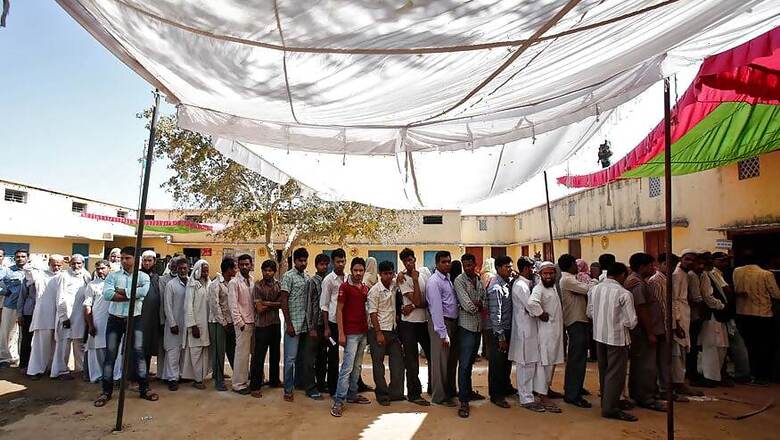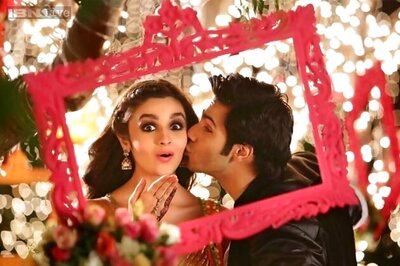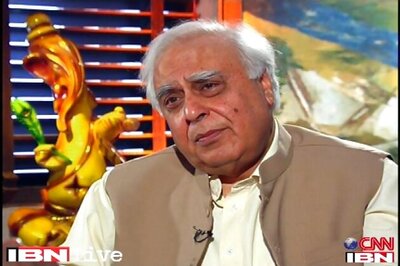
views
The myth of the Muslim vote bank persists despite the fact that Muslims have never voted en bloc. Even in the famous pre-independence 1937 election when the Muslim League lost in UP, the Muslim vote was split partly along ‘caste’ and sectarian lines, with large sections of the ‘Ansari’ or weaver community and the Shia, for instance, siding with the Congress Party. Now exactly 80 years later there is little to suggest that the Muslims have been mobilized to vote as a block. With the Uttar Pradesh elections looming there is no shortage of pontifications about which way the Muslim vote will swing and every political party is out to woo Muslim voters.
The BJP, which often proclaims that it is against all ‘vote bank’ politics, has sought to make inroads amongst urban Shia voters and to a lesser extent among the rural vote. Additionally they have sought to cultivate prominent Sufi figures in a bid to not only split the Muslim vote (which of course is already divided) but by also trying to promote those they regard as ‘good Muslims.’ The Congress too is seeking to cash in on its secular credentials – doubted before partition and decidedly tarnished after 1992 and the demolition of the Babri Masjid. The Bahujan Samaj Party (BSP) has openly sought to promote a Muslim-Dalit alliance, distributing 97 tickets to Muslims. This is despite Mayawati’s public outcry in the last elections that she had lost because of the Muslims. In a state that has a 44% OBC population, the Samajwadi party has traditionally banked on a combination of voters drawn from various OBC groups as well as a section of the Muslim vote.
For the past three decades Mulayam Singh has been able to cultivate this Yadav-Muslim alliance and it has paid rich political dividends. Now however, with the ostensible infighting amongst family members, there is skepticism as to whether the Muslims will choose to remain with Mulayam, side with Akhilesh, or indeed throw in their lot with the BSP. What is for certain is that a combination of part of the 19% Muslim vote and the 35% non-Yadav OBC vote will be the deciding factor in this election. Again, despite its rhetoric against using caste and religion the BJP has deployed politicians like Parvesh Varma, Anupriya Patel and Swami Prasad Maurya to attract the non-Yadav OBC vote. Despite these ground realties, both Narendra Modi and Akhilesh Yadav have chosen to give the impression that they are choosing to campaign on a platform of development.
However, in a state like UP the fact remains that most people, be they Hindu or Muslim, vote strategically according to local imperatives. These tend to be based on the perceived clout of a candidate and their ability to act as facilitators between government institutions and voters. Thus an important factor, particularly in rural areas, is the hold a candidate has on the local thana or police station and tehsil or the land revenue office. It is important to remember that the logic underpinning votes in national elections is very different from the logic driving voters in state assembly elections. While the rhetoric of development, muscular nationalism and other such ‘emotional’ appeals might work in the former, local elections tend to be distinguished by a much more instrumental vote based on a calculation about access to power. Indeed, while travelling around various constituencies in the 2012 elections, one of the notable trends I discovered amongst rural Muslim voters was that different members of the same family would cast their votes for different parties so that no matter who came to power, they would have some kind of political access. The reason that caste remains important in this calculation is that voting along caste lines increases the chances of acquiring political patronage and therefore access to power.
In the upcoming elections one factor guiding the Muslim vote, though by no means the deciding one, will be the likelihood of a strong local BJP candidate. In such scenarios, the calculation as to who to vote for will be made by judging whether the SP, BSP or Congress candidate is the most likely to defeat the BJP aspirant. Thus, Muslims will not vote for any one party uniformly across UP but rather their choice will be driven by local exigencies. In all likelihood - the Muslim vote will be divided, as it has always been, between the SP and the BSP, with a smaller share for the Congress. In the previous election as well as the forthcoming one, small political parties that style themselves as Muslim parties have tried to make inroads in UP, usually without much success. One such party is Dr. Ayub’s Peace Party and they were roundly routed in 2012. The good doctor is making another go of it in 2017, as is the All India Majlise Ittehadul Muslimeen (AIMIM) headed by Asaddudin Owaisi. In all likelihood both these parties will fare poorly and will at best eat into the Muslim vote-share of both the SP and the BSP, which can only be of benefit to the BJP.
In any case, what is certain is that the Muslim vote, albeit not consolidated, will be crucial for both Mayawati and Akhilesh/ Mulayam if they are to form government. Mayawati is already deploying the rhetoric of Dalit-Muslim bhaichara as a counter to the BJP’s efforts to cut into her Dalit vote bank and she is actually counting on communal rather than caste politics to garner a win. Azam Khan of the SP is particularly worried about an internal split in the Samajwadi party as the Muslim vote will get further diluted and his frantic attempts to mediate between father and son illustrate the urgency with which he views the situation. On the other hand however, the family feud has also helped remove anti-incumbency feelings against Akhliesh and has also diverted attention from the relatively poor record the SP has had in dealing with the 12000 odd communal incidents in the last 4 year. The Congress, in a desperate bid to stay relevant in UP, is seeking some sort of alliance with Akhilesh, while the BJP is deploying people like Yogi Aditynath, Sakshi Maharaj and Parvesh Varma to counter-mobilise the Hindu vote. Electoral predictions aside, the question that remains most critical of course, is what is to follow once the dust has settled. That is to say – what does the electorate, Muslim and otherwise, stand to gain from those it puts in power.
(The author is assistant professor, Ashoka University. The views expressed in the article are those of the author)



















Comments
0 comment